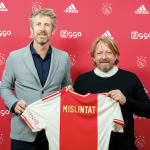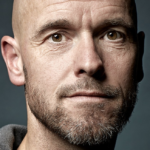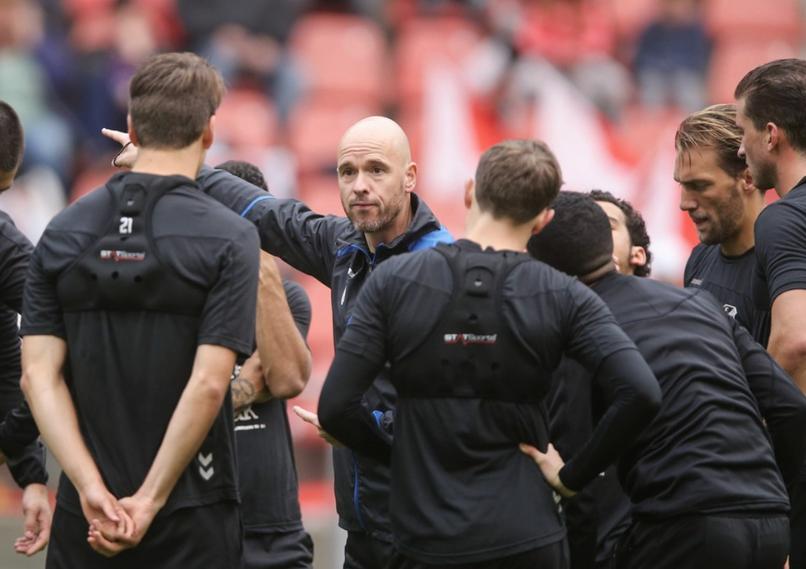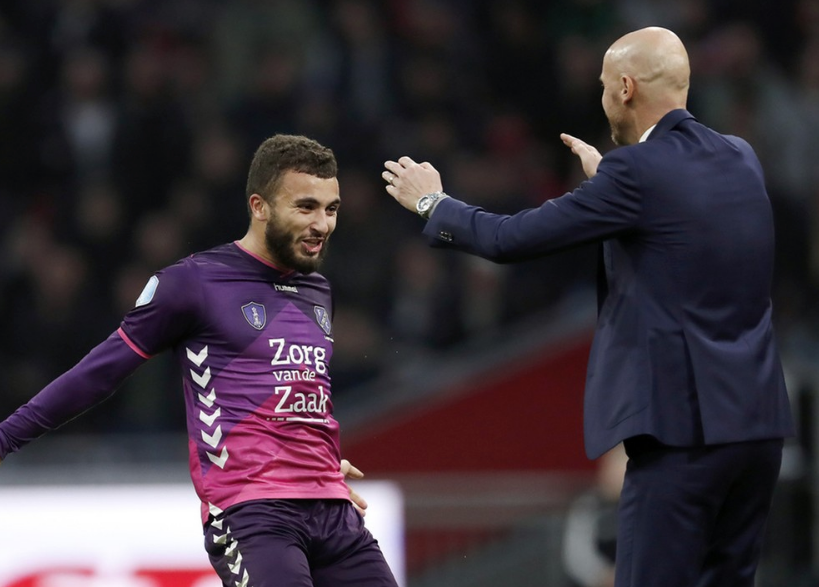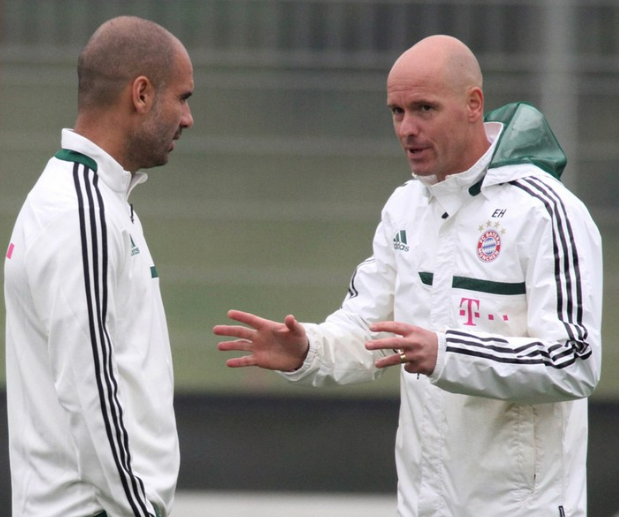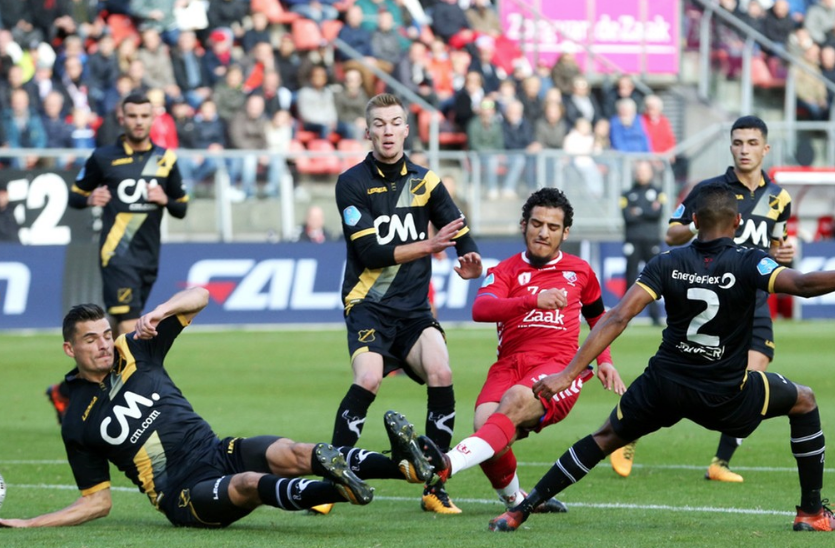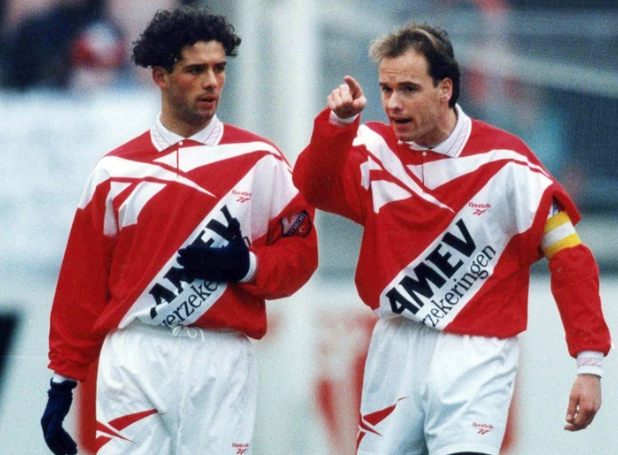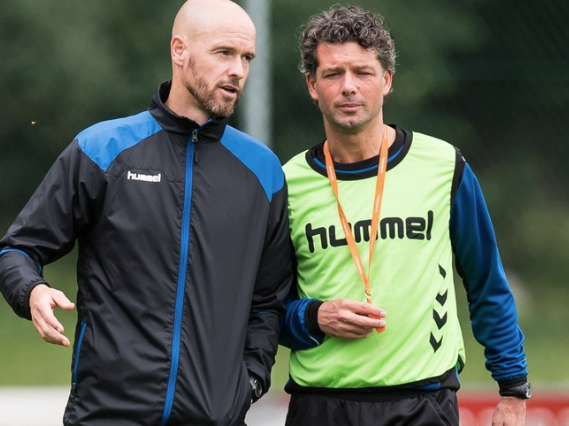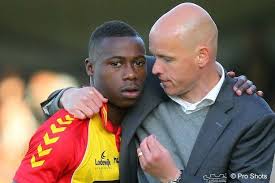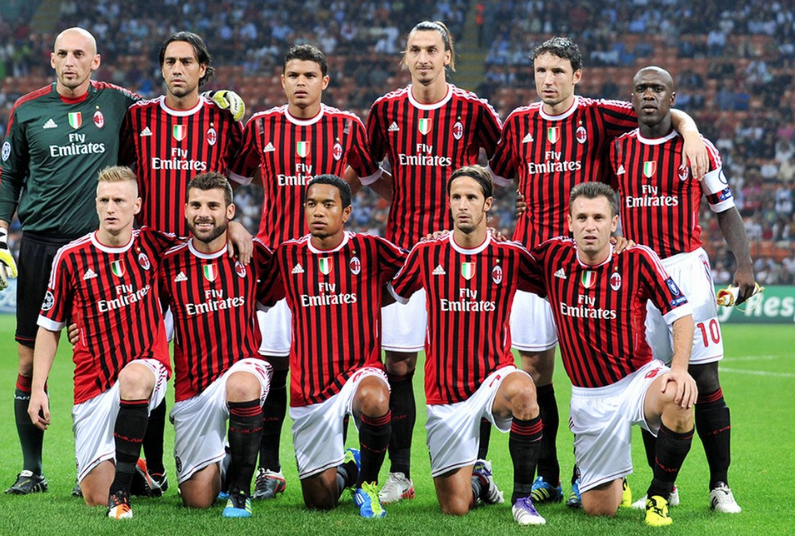For decades, ever since Oranje and Cruyff wooed the world with their break through Total Football ( even if it was Happel at Feyenoord who initiated it), Ajax has been synonym with “class”, “technical football” and youth development.
A factory, churning out talent after talent. From Cruyff, Krol, Rep, Suurbier to Van Basten, Van ‘t Schip, Rijkaard, Vanenburg all the way to Seedorf, Davids, Kluivert, De Boer Bros, Van der Vaart, Sneijder and Frenkie de Jong and more recently Gravenberch, Brobby and Timber…
All managed by a host of former Ajax players in top football roles ( Danny Blind, Ruud van Duyvenbode, Arie van Eijden, Wim Jonk, Sjaak Swart, Louis van Gaal, Co Adriaanse), as part of a close knit network, the Fifth Colonne as it’s called in The Netherlands. Scouts, youth coaches, analysts, agents, Ajax always seemed to be a many tentacled octopus, delivering dozens of former youth products to literally every club in The Netherlands.
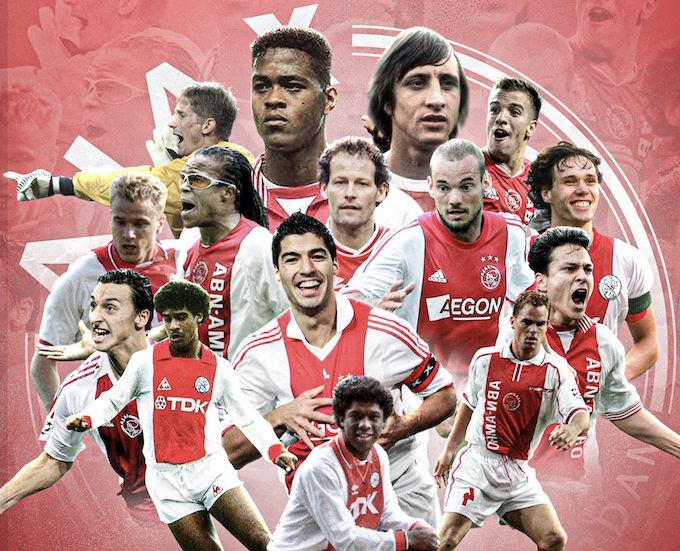
Do you recognise all these incredible talents?
Noa Lang (ex Feyenoord as well) at PSV. Quinten Timber at Feyenoord (originally also Feyenoord by the way), Eagles’ captain Bas Kuipers, Mitchel van Dijk at Fortuna, Czerny at Twente (former season), Warmerdam at Sparta, Baas at Twente, Eijting at Twente, the list is long. No one will dispute the majestic impact Ajax’ has had on Dutch football.
They may not have been the first (or last) to win a European trophy but they did win most of them.
That huge Football Emporium is slowly disintegrating before our eyes. With a massive loss versus Arch Rivals Feyenoord 0-4 as the lowest of the low, particularly the off pitch shenanigans with hooded “fans” trying to storm the Cruyff Arena, to lynch a couple of board directors.
So where did it go wrong?
For me, arrogance is a key factor. Ajax always pride themselves as the Sons of Gods, the best of all. This arrogance is typical maybe for the city of Amsterdam, where the street smart bravado has always been a factor. The city of advertising and media execs (as opposed to industrial Eindhoven (Philips), or transport-focused Rotterdam (ports).
“”We are Ajax” is what you need to radiate when you walk onto the pitch, so you’re already 1-0 when the opponent looks at us coming out.” The jersey, the hairdo, the chest forward and chin up attitude. And the Ajax culture truly wants players to emphasize this.
When Ajax was struggling to play attractive football (under Frank de Boer for instance), the legendary Johan Cruyff started his Velvet Revolution, aided by the likes of Wim Jonk, Dennis Bergkamp, Keje Molenaar and Marc Overmars.
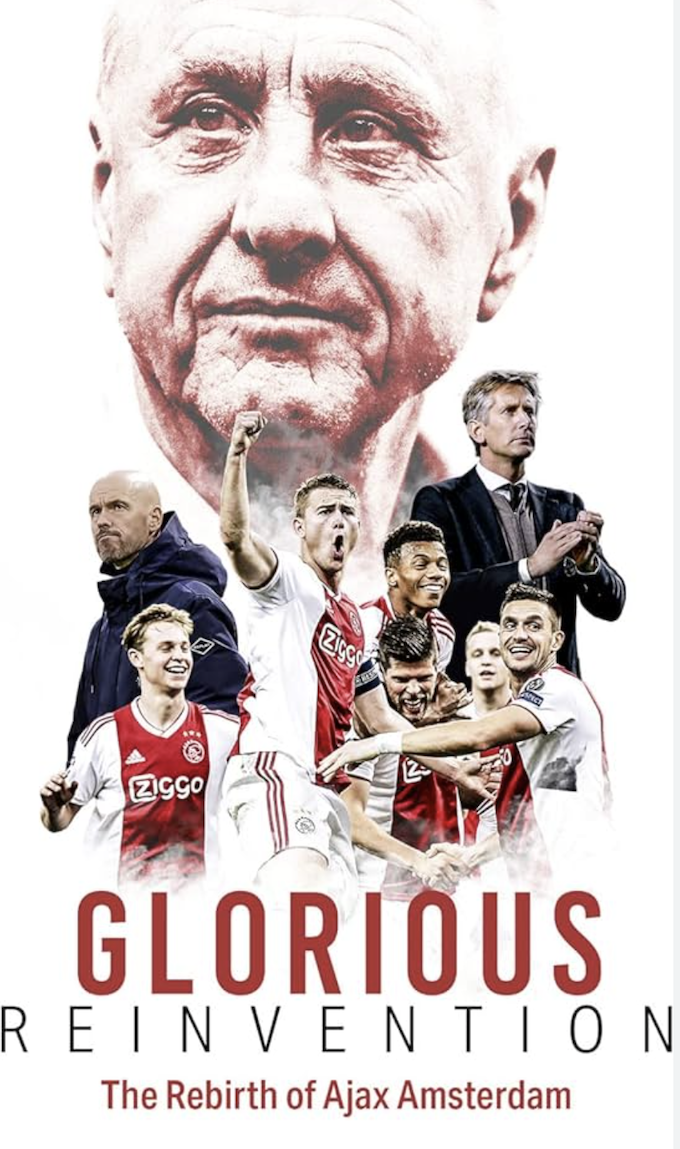
It got made into a book! I can see Christopher Walken in the JC role and Stephen Merchant as Van der Sar. Maybe Ricky Gervais as Marc Overmars? Ryan Gosling as Bergkamp?
Ex-players needed to take charge of the club, just like at Bayern Munich. Overmars earned his stripes as a business man and manager, partly due to his hobby to buy and upgrade real estate and trading in classic cars, while acting as technical director at Go Ahead Eagles (where he started his pro career and where he worked with you maverick coach Erik ten Hag).
Edwin van de Sar was being courted to become the new managing director (after his business studies at the Cruyff University), while Jonk and Bergkamp would become part of the technical management triumvirate (with Overmars and Frank de Boer).
The plan didn’t work out too well. Jonk left angrily, as his input to use Academy products was ignored. Bergkamp had to leave after a conflict with Overmars ( he pushed Peter Bosz out and pushed his friend Marcel Keizer for the head coach role) so the management team running the club consisted of Marc Overmars and Edwin van der Sar (and a financial and commercial director of course, but these company officals are not relevant for this particular topic).
And both Overmars and Sar were being monitored by the Board of Directors, which had Danny Blind as the football man. Blind played an important role in the background, as the sounding board for coaches and management, but Blind left the role when Van Gaal was brought back to Oranje as head coach. Van Gaal wouldn’t do it without his lieutenant Danny. So Ajax did not have a football smart director in the Board but this was not so crucial, as Overmars and Sar had a good grip on Ajax, which stole more hearts in Europe under Ten Hag, particularly in that 2019 CL Campaign, with Frenkie, Tadic, Ziyech and Tagliafico in stunning form.
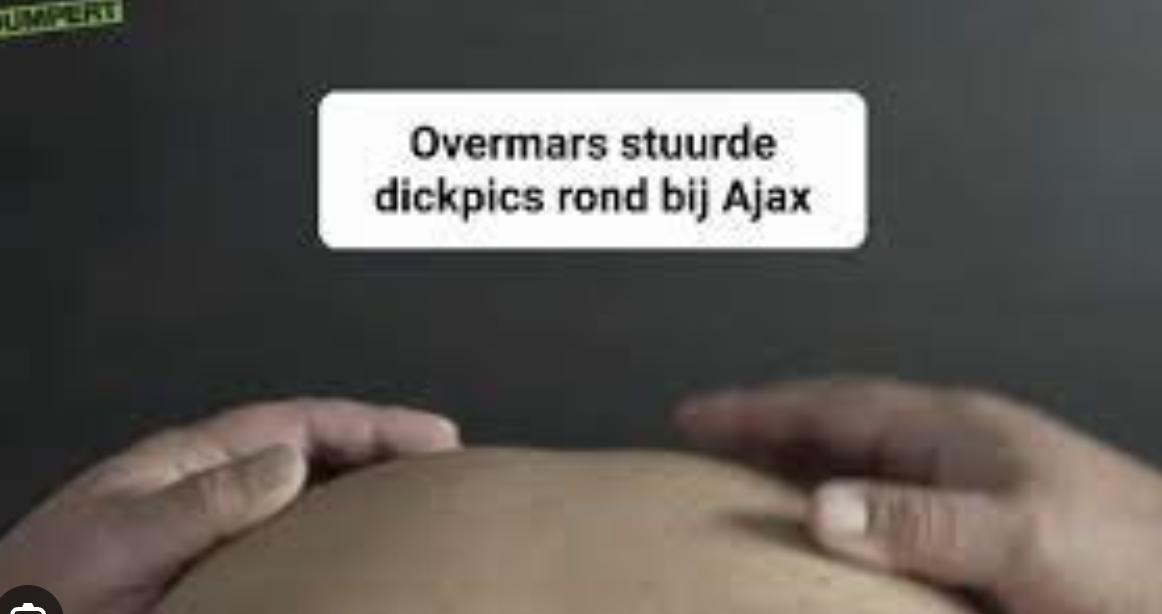
This is one of the dick pics Overmars sent hahahaha….
The bubble burst in Ten Hag’s final year. What no one could have predicted happened. Marc Overmars appeared to have sent dick pics (!!!) to several female colleagues on the Ajax marketing desks. And the macho culture within Ajax was such, that the women/girls were afraid to complain about it.
The news shocked the Dutch bonton world and when it became clear that this 1) had been going on for quite a while and 2) Van der Sar was aware but didn’t want to intervene, the popularity rating of the Sons of Gods plummeted.
Van der Sar couldn’t do much different than sack Overmars, but as the lanky manager hoped to re-instate the once speedy winger in this role, he was quite successful after all, Van der Sar never appointed a successor.
So half of the successful due “Overmars / Ten Hag” had to leave the club and the other half wouldn’t stay much longer, as Manchester United lured the champion maker to Old Trafford.
Van der Sar, who already had a string of mismanagement dossiers to his name (the Nouri case, the Quincy Promes case, the Winston Bogarde case), decided to push KJ Huntelaar and scout Gerry Hamstra in the role of “acting Technical Directors”. The problem – Ajax being a publically listed company – was that both H’s didn’t have the authority to sign contracts, so Van der Sar decided that he would be the technical director / managing director and he would be more “hands on” when transfers were concerned.
Ten Hag went. Alfred Schreuder came. There was no technical director present in that transfer window, so an overzealous Schreuder stepped in, together with his agent to help Ajax sign some new players.

That summer, some big names and powerful characters left the club: Brobbey went to Leipzig, Tagliafico to Lyon, Martinez to Man United, Mazaroui to Bayern, Onana to Inter, Haller to Dortmund, Schuurs was allowed to leave for Torino and Antony also left for Man United. Some of these were unavoidable, some of the others (Schuurs, Tagliafico) maybe less so.
In place of these players, Ajax brought in Calvin Bassey, Lorenzo Lucca, Owen Wijndal, Jorge Sanchez and Florian Grillitsch. Schreuder and Van der Sar were also keen to bring Sevilla forward Ocampos to the Arena, but the Board of Directors felt that signing was close to being preposterous and stopped that. They did allow for Ocampos to come on a loan basis. No surprise here, that Ocampus ended up a failure, as any football knowledgable person would be able to predict: Ocampus would probably work at PSV but lacks the skills to play the Ajax style.
The Board of Directors gave a clear signal to the coach/management but allowed for the signing of the others.
Just to give you an idea: Sven Botman left Ajax for 8 million euros. Calvin Bassey came from Rangers for 21 Million euros. Per Schuurs left for Torino, for 9 million euros. Crazy.
Schreuder didn’t have the greatest first season’s half at Ajax and came to clash with club icon Daley Blind, resulting in the international leaving the club mid-season, which in turn resulted in Danny Blind – fresh from the World Cup in Qatar – to sever his ties with Ajax’ Board of Directors. Leaving another great hole of football know-how in the Ajax hierarchy.
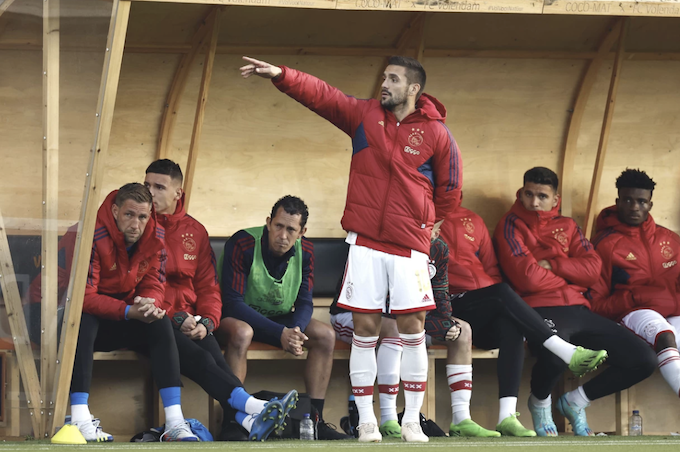
Tadic apparently taking over from Schreuder, last season
So, there is a Board of Directors of people without any real football know-how: Eringa ( resigned this week) is a notorious job-hopper with a career in hospitals and railways. Annette Mosman is an accountant. Cees van Oevelen is a lawyer. Georgette Schlick is a media person.
Apart from these people, Maurits Hendriks was added to management, as Chief Sports Officer. No one knows what the former Hockey coach was going to add to Ajax
Van der Sar had the power but didn’t know what to do with it. Ajax was now a year without Technical Director and during the Schreuder (and later Heitinga) season, the first cracks became apparent. Tadic unhappy, Blind gone, Wijndal never played, Berghuis started fist fights with supporters, Ocampos returned to Sevilla halfway the season and Ajax would finish the season third, only 2 points above AZ Alkmaar.
Van der Sar was now convinced that a true Technical Director was needed (Overmars found a new home in Antwerp) and Maurits Hendriks enlisted the help of an Executive Search (headhunter) bureau to find the ideal candidate.
Now, these things don’t work too well in the world of pro football. There is no linkedin. And the coach resume is simply how he performed with other clubs / teams. In terms of quality of performance, results achieved and how the guy holds up in press conferences and interviews.
By then, it appeared impossible to hold Van der Sar accountable. And lets face it: he’s not the only guilty party. What about the Board of Directors, who were there to check the shenanigans of their GM. But after the different botches affairs, Sar’s biggest mistake was to not replace Overmars. He saw the writing on the wall and announced his resignation (per August 1) but before he was able to truly pass the baton, he suffered a debilitating stroke and is now at home, basically learning how to walk and talk again.
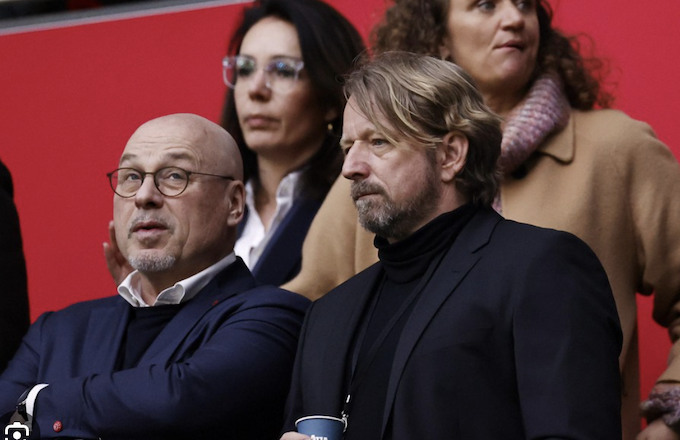
Former Hockey coach Hendriks responsible for signing Sven Mislintat
Obviously, no one feels the need to string the former Oranje goalie up for his mistakes. We wish him well.
But the usual suspects for the TD job weren’t good enough. AZ’s Max Huiberts, Frank Arnesen (who found Arne Slot for Feyenoord), Jordi Cruyff, Wim Jonk, Marijn Beuker, Jan Streuer, Maxwell, Julian Ward… For some reason, Hendriks and the Ajax board decided on a guy 1) no one heard of in The Netherlands and 2) who was known to be a lone wolf (according to former employers Stuttgart who didn’t extend his deal) and who had a reputation of looking for conflict (according to former employers Arsenal). The man who hardly had any experience as technical director but who made a name in Germany for himself as top scout.
As per usual, the technical director selects the new coach. Peter Bosz was keen to return to Ajax, as his nemesis Bergkamp had left, but for some reason Ajax (Mislintat?) decided against re-hiring Bosz. It’s unclear who else was on the short list. Heitinga had blown it ( his results weren’t overly great), Nagelsmann apparently wasn’t interested but we’ll never know who else was on the list. Mislintat ended up with Maurice Steijn, the Dutch coach who had previously impressed with ADO Den Haag, VVV and Sparta Rotterdam and who was considered another Henk ten Cate protege (like Arne Slot and Alfred Schreuder).
Mislintat: “I came to focus on Steijn, because he manages to get results better than to be expected with the material he works with. He let Den Haag, VVV and in particular Sparta hit well above their station and that is what we need to get Ajax quickly back to the top.”
Steijn is also a Dutch coach, which helps with the language and he’s known to be a tough taskmaster, as the The Hague street mentality would work well in Amsterdam, people believed. Steijn was quite adamant that he wanted Said Bakkati as his assistant (formerly Dick Advocaat’s assistant at Feyenoord and Jaap Stam’s second in command at Cincinnati). He was assistant at ajax U21 in 2014 and is no stranger to the club. Former midfielder Hedwiges Maduro, considered a top coach in the making, was also high on Steijn’s list. He got them both.
As per usual, Steijn gave his list of preferred new signings to Mislintat, assuming the TD would work his magic to get the characters and types Steijn wanted. Steijn made a point to say he preferred players from The Netherlands. Like Feyenoord was able to build a success team with players brought in from AZ, Twente, Excelsior, this is exactly how Steijn also believed he could build from the bottom up.
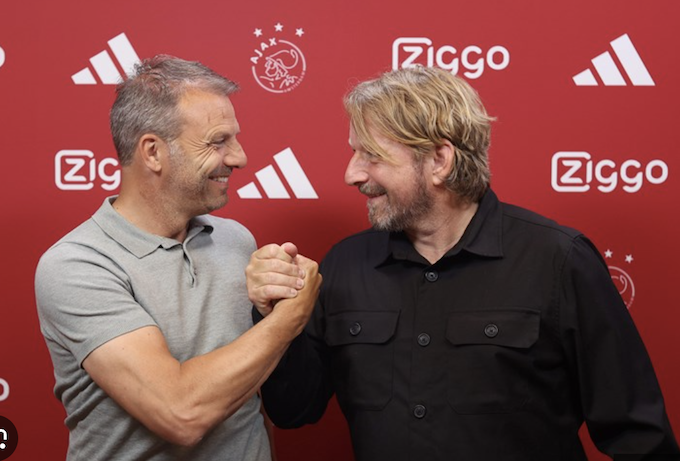
How it started…
To Steijn frustration, Mislintat ignored the requests from Steijn and delivered a number of fairly unknown players to the JC Arena.
Branco van de Boomen’s signing (on a free) can be justified. The signing of Sutalo (Croatian international) can also be explained, just like Forth’s move from City to Ajax can be a good one, in time.
But where Ajax saw the likes of Frenkie de Jong, De Ligt, Ziyech, Haller, Tagliafico and Martinez go, they decided to bring replacements in from Viborg, from Eintracht, Molde, Middlesbrouh and Metz…
Literally none of these players were known entities amongst the Ajax supporters and it’s now wonder Mislintat was heading for a rough ride.
When Steijn was asked if he was happy with the players he was gifted, he said the following: “I don’t know, I really don’t know most of them, sorry. I need to check them out and see. I gave my list of preferred players to Sven but sadly, he decided to use his own list. They’re his players.”
A telling interview indeed.
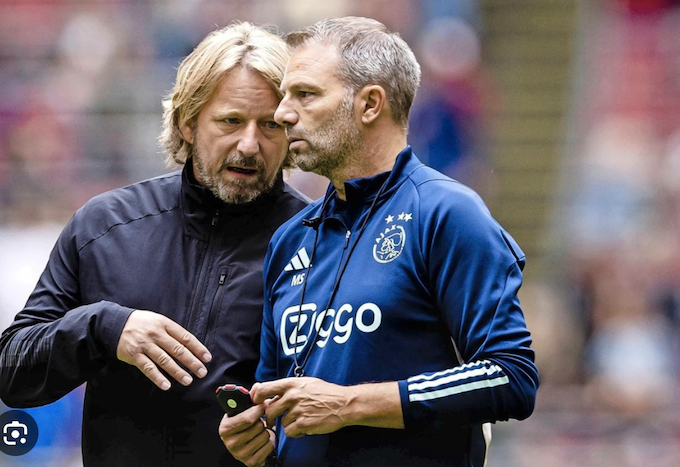
How it ended….
Not much later, the news broke that Mislintat had verbally abused the coaching staff and goalie Jay Gorter during a training session. He told the coaches that Steijn would be sacked if Ajax lost against Feyenoord (they did) and he told Gorter he was supposed to make way for the new German goalie.
As if this wasn’t enough, the Telegraaf newspaper broke the news that Mislintat was the subject of an internal investigation. It appeared that he owned shares in a sports marketing company, which has a particular players agent as shareholder as well. Guess what. Mislintat would speak to potential new signings, telling them that if they want to move to Ajax, they were to ditch their current manager and go with the agent who happens to be – coincidence coincidence – Mislintat’s partner in the business. Wow. How low can you go?
On the day of (the first) Ajax – Feyenoord, Ajax decided to let the TD go. The internal investigation is still going, by the way, but despite this, Ajax could see the writing on the wall: this was never going to go well.
😳🇳🇱 Ajax fans are not happy after they went 3-0 down to Feyenoord… game has been officially abandoned. Flares also thrown onto pitch. pic.twitter.com/afvvsuT3Nc
— EuroFoot (@eurofootcom) September 24, 2023
The first thing Ajax did, was to appoint Van Wijk and Van Praag (two elderly Ajax statesmen) to the Board of Directors and Michael van Praag immediately called his friend Louis van Gaal with the request to consult Ajax in how to structure the future.
Maurice Steijn is still coach and asked about Van Gaal’s role, he responded positively: “I have worked with him before. When he was national team coach in 2012, I was coach of ADO and Oranje used to train on our grounds. Louis would ask me for ADO players, if he needed additional bodies and we spent quite some time together. I still use his lessons in my coaching and I look forward to his insights and advice.”

